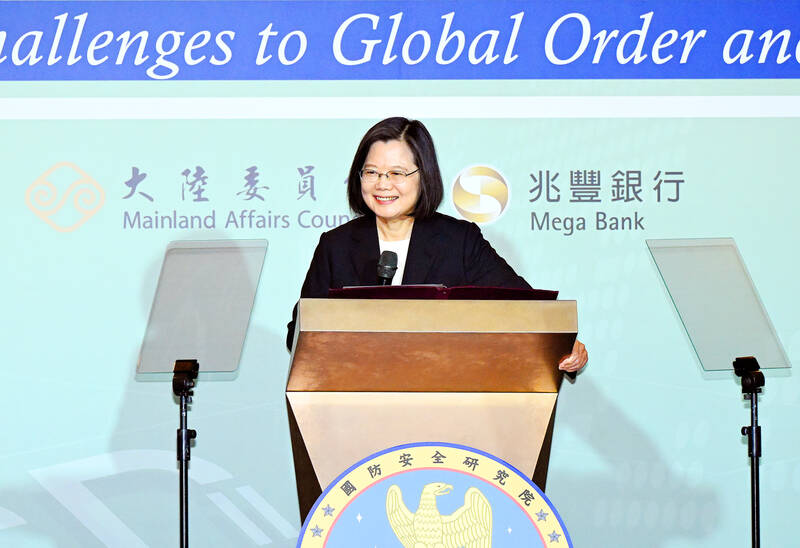The world “cannot take peace for granted” amid mounting challenges to the international order posed by authoritarian states, President Tsai Ing-wen (蔡英文) said in a speech highlighting Taiwan’s efforts to defend itself against China.
Tsai was speaking at the Taipei Security Dialogue hosted by the Institute for National Defense and Security Research in Taipei.
The outbreak of major conflicts and the COVID-19 pandemic have destabilized the global economy and threatened the world order, she said.

Photo: Liao Chen-hui, Taipei Times
Academics from Australia, the Czech Republic, France, Germany, India, Japan, Singapore, Turkey, the UK, the US and elsewhere attended the conference on countering the challenge Beijing poses to the global order and democracies.
Democratic nations must “stand fast in our defense of freedom and democracy” at a time of instability, Tsai said, an apparent reference to the Russian invasion of Ukraine and the Israel-Hamas war.
The most pressing threat to free and democratic nations comes from authoritarian regimes, including Beijing’s “escalating gray-zone activities [that] have created serious instability” in the Indo-Pacific region, she said.
Taiwan is particularly targeted by China’s gray-zone tactics, including “increasingly frequent incursions into our ADIZ [air defense identification zone] and military exercises in our vicinity,” she said.
The nation also faces “economic coercion and persistent cyberattacks,” Tsai said.
“Taken as a whole, these hybrid tactics are designed to deplete Taiwanese people’s confidence in our democracy and to undermine our resolve to defend ourselves,” she said. “The people of Taiwan are determined to protect our own hard-earned freedoms. Our priority therefore is to enhance our self-defense capability and social resilience.”
Taiwan has reinstated one-year compulsory military service, furnished conscripts with more realistic training and reorganized its force structure to meet the challenges of modern warfare, Tsai said, highlighting her administration’s defense policies.
The nation’s defense budget has increased in the past eight years to achieve a year-on-year growth rate of 7.7 percent, she said, adding that Taiwan is on track to spend 2.5 percent of GDP on its military next year.
In September, Taiwan launched a prototype from its indigenous defense submarine program, reaching a milestone in the nation’s domestic naval production program, she said, adding that many had deemed the project to be too ambitious.
“These achievements are a testament to our unwavering resolve to defend our country,” Tsai said.
The nation also has to counter non-conventional threats, including cognitive warfare, which uses misinformation and disinformation to “exploit and drive polarization in free and democratic societies,” she said.
Taiwan’s response is to “equip our people with the knowledge to refute and report ... misleading information to strike a balance to maintaining the free flow of information while denying information manipulation,” Tsai said.
“As a responsible member of the international community, Taiwan will continue working to maintain regional peace and stability while expanding and deepening [collaboration] with other stakeholders,” she said.
“With democracies around the world facing their greatest test in a generation, it is crucial that we come together in deterring adventurism and aggression in the region,” she said, calling for more international support for Taiwan.

MAKING WAVES: China’s maritime militia could become a nontraditional threat in war, clogging up shipping lanes to prevent US or Japanese intervention, a report said About 1,900 Chinese ships flying flags of convenience and fishing vessels that participated in China’s military exercises around Taiwan last month and in January last year have been listed for monitoring, Coast Guard Administration (CGA) Deputy Director-General Hsieh Ching-chin (謝慶欽) said yesterday. Following amendments to the Commercial Port Act (商港法) and the Law of Ships (船舶法) last month, the CGA can designate possible berthing areas or deny ports of call for vessels suspected of loitering around areas where undersea cables can be accessed, Oceans Affairs Council Minister Kuan Bi-ling (管碧玲) said. The list of suspected ships, originally 300, had risen to about

DAREDEVIL: Honnold said it had always been a dream of his to climb Taipei 101, while a Netflix producer said the skyscraper was ‘a real icon of this country’ US climber Alex Honnold yesterday took on Taiwan’s tallest building, becoming the first person to scale Taipei 101 without a rope, harness or safety net. Hundreds of spectators gathered at the base of the 101-story skyscraper to watch Honnold, 40, embark on his daredevil feat, which was also broadcast live on Netflix. Dressed in a red T-shirt and yellow custom-made climbing shoes, Honnold swiftly moved up the southeast face of the glass and steel building. At one point, he stepped onto a platform midway up to wave down at fans and onlookers who were taking photos. People watching from inside

Japan’s strategic alliance with the US would collapse if Tokyo were to turn away from a conflict in Taiwan, Japanese Prime Minister Sanae Takaichi said yesterday, but distanced herself from previous comments that suggested a possible military response in such an event. Takaichi expressed her latest views on a nationally broadcast TV program late on Monday, where an opposition party leader criticized her for igniting tensions with China with the earlier remarks. Ties between Japan and China have sunk to the worst level in years after Takaichi said in November that a hypothetical Chinese attack on Taiwan could bring about a Japanese

The WHO ignored early COVID-19 warnings from Taiwan, US Deputy Secretary of Health and Human Services Jim O’Neill said on Friday, as part of justification for Washington withdrawing from the global health body. US Secretary of State Marco Rubio on Thursday said that the US was pulling out of the UN agency, as it failed to fulfill its responsibilities during the COVID-19 pandemic. The WHO “ignored early COVID warnings from Taiwan in 2019 by pretending Taiwan did not exist, O’Neill wrote on X on Friday, Taiwan time. “It ignored rigorous science and promoted lockdowns.” The US will “continue international coordination on infectious